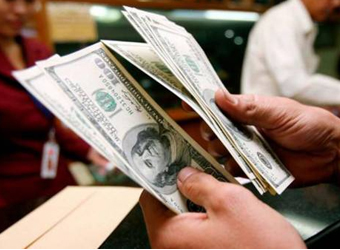The dollar firmed against a basket of currencies on Tuesday as the euro and sterling were pressured by political uncertainties in the UK and eurozone, even as it surrendered ground against the perceived safe-haven yen.
The dollar index, which tracks the greenback against a basket of six rival currencies, rose 0.2 percent to 97.659, pulling further away from a 6-1/2-month low of 96.797 plumbed last week.
U.S. and UK markets were closed for holidays on Monday, giving investors fewer directional clues to follow.
British Prime Minister Theresa May’s lead over the opposition Labour Party dropped to 6 percentage points in a poll published on Tuesday, the latest to show a shrinking lead for the ruling Conservatives ahead of June 8 elections since the Manchester terrorist attack.
The euro was on the defensive as worries about Greece’s financial situation also re-emerged, after its finance minister said on Monday that its creditors need to reach a deal on debt relief measures at the next meeting of euro zone finance ministers in June to help the country return to bond markets. A German press report said Athens may opt out of its next bailout payment if creditors cannot strike a deal.
“The lenders will meet next month, and people expect them to reach an agreement, because it always happens like this, with fears that they won’t,” said Kaneo Ogino, director at foreign exchange research firm Global-info Co in Tokyo.
“But in the meantime, worries about Greece and Italy provided a good excuse for people who want to reduce their long positions in the euro,” he said, after the European currency rose to a 6-1/2-month high of $1.1268 last week.
European Central Bank President Mario Draghi failed to give the euro much help on Monday, citing improved growth but repeated the need for “substantial” stimulus as inflation remained subdued.
Former Italian Prime Minister Matteo Renzi said on Sunday that it makes sense “from a European perspective” for Italy’s next election be held at the same time as Germany’s, scheduled for September. His comments led to a selloff in Italian government debt on Monday.
“The euro is under downward pressure following Renzi’s comment that he would favour snap elections,” as well as proportional representation that could lead to a hung parliament, said Masafumi Yamamoto, chief forex strategist at Mizuho Securities.
“It seems the market has begun to realize there’s political uncertainty in Italy,” he said. “The dollar/yen, meanwhile, is waiting for clarification on balance sheet reduction by the Fed.”
Markets are mostly pricing in the possibility that the U.S. central bank will raise interest rates by a quarter point to 1.00-1.25 percent at its June 13-14 policy meeting, with attention turning to clues on the timing of when the Federal Reserve intends to begin paring its $4.5 trillion balance sheet.
The dollar slipped 0.4 percent against its Japanese counterpart to 110.85 yen, but remained mired in its recent narrow range between last week’s high of 112.13 and May 18’s low of 110.24.
“Already a rate hike is discounted in the market, so there needs to be some additional factors in order for the dollar to resume testing the upside,” said Koji Fukaya, president at FPG Securities in Tokyo.
“But there are uncertainties over the Trump administration, and if fiscal policy will expand or not, or if the economy will accelerate,” he said.
“The dollar’s upside is limited, so it’s testing the downside. U.S. President Donald Trump continued to defend his administration against reports that his son-in-law tried to set up a secret channel of communication with Moscow before Trump took office.”
Trump’s recent firing of FBI Director James Comey, who had been investigating possible links between the campaign team and Russia, raised anxiety about promised fiscal stimulus steps and tax reform.
The euro tumbled 0.7 percent to 123.82 yen after falling as low as 123.24, its weakest since May 18.
Data released early in the session showed labor demand in Japan rose to its strongest in more than 40 years while the unemployment rate held steady at a two-decade low last month, offering hope that a tight labor market will eventually spark a turnaround in weak consumer spending and inflation.
Source: Reuters


